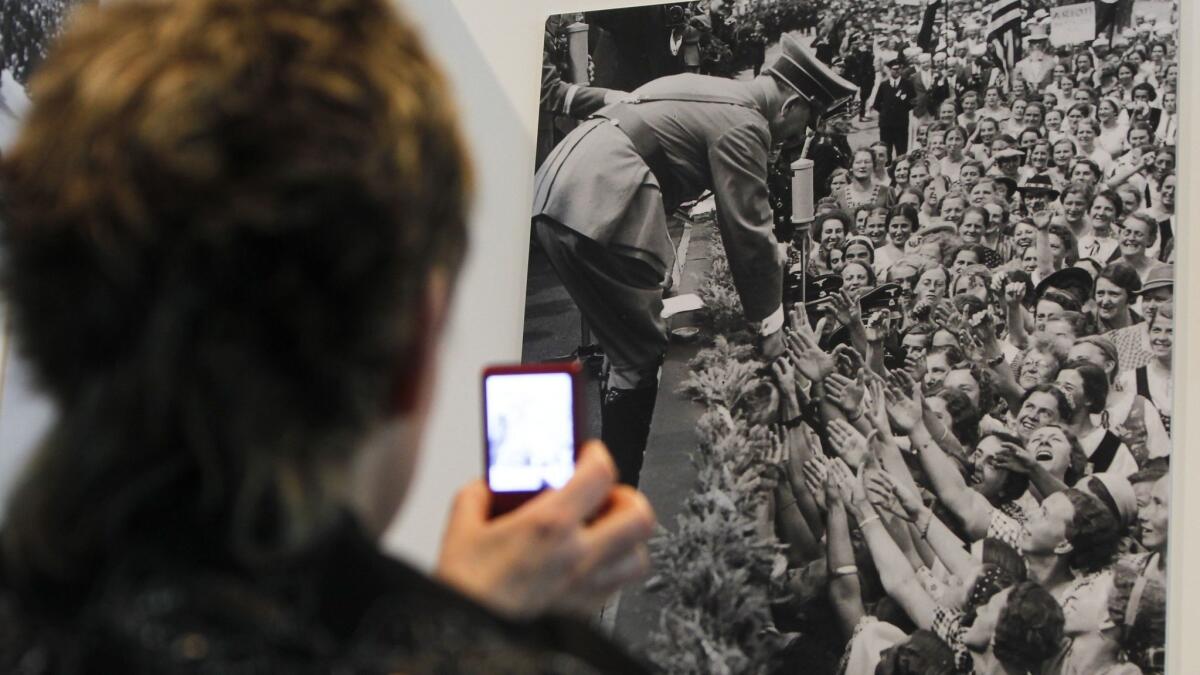Op-Ed: Hitler would have loved social media

- Share via
On April 29, 1945, just one day before he would commit suicide in his bunker, Hitler made this prediction:
“Centuries will pass away, but out of the ruins of our towns and monuments the hatred against … international Jewry and its helpers will grow.”
Hitler knew he had lost the war — and that despite the killing of millions of Jews throughout Europe, his goal of eradicating all Jews had failed. Allied armies took control of death factories from Auschwitz to Mauthausen and recorded the grisly evidence of what would be called the Nazi Holocaust. The swastika became a symbol reviled by the world.
But Hitler was dead wrong in his prediction of what would come next. He believed it would take centuries for anti-Semitism to come roaring back. It has taken just 75 years.
Rabbis in Paris, London, Amsterdam, Copenhagen and Stockholm are now cautioning parishioners not to don yarmulkes or Star of David necklaces, lest they be attacked in broad daylight in these capital cities.
Hitler believed it would take centuries for anti-Semitism to come roaring back. It has taken just 75 years.
In Gothenburg, Sweden, resurgent, violent neo-Nazis protested near the city’s synagogue on Yom Kippur; later it was firebombed. Elsewhere in Sweden, a Jewish community center in the north was forced to permanently close because of threats from latter-day Nazis.
In Denmark, incensed Jewish leaders are demanding that authorities ban far-right extremists from launching verbal attacks against Jews at the national monument to the victims of World War II. Everywhere in Europe, identifiable Jewish schools and houses of prayer must have visible armed security or risk the consequences.
Democratic Germany is not immune to anti-Semitism, so much so that numerous states have followed suit after Berlin named Dr. Felix Klein the first national commissioner to combat anti-Semitism.
In 2019, Jews in Europe will continue to face multi-pronged threats from neo-Nazi and xenophobic groups on the far right, from elements of the left, millions of whom believe Israel is treating Palestinians the way the Nazis treated Jews, and Islamist emigres who were brought up in their native lands to hate all things Jewish and Israeli.
Is it any wonder that a recent European Commission poll found that nine out of 10 European Jews believe anti-Semitism has increased over the last five years and nearly a third avoid attending any Jewish event?
We once asked our institution’s namesake, the late Nazi hunter Simon Wiesenthal, if he was surprised by how many Nazis there were. “No,” he replied, “only by how few anti-Nazis there were.”
Embattled European Jewish communities, built on the ashes of the Holocaust, must be wondering if today’s Europe has enough anti-Nazis to overcome the massive silence and indifference to contemporary anti-Jewish bigotry.
America is not immune from the hate. In fact, FBI annual hate crime statistics compiled since the 1990s confirm two facts: African Americans are the No. 1 target of racial hate crimes and Jews, despite constituting just 2% of the population, are the largest target of religion-based hate crimes.
The massacre of 11 Jews at prayer on a Sabbath morning at a Pittsburgh synagogue was the worst anti-Semitic attack in the history of the United States. American Jewry was buoyed by the outpouring of love and solidarity from their non-Jewish neighbors. including members of the Pittsburgh Steelers, who attended a funeral for one of the victims, and the Pittsburgh newspaper, which ran the Hebrew Kaddish on its front page. Around the nation, non-Jews quietly attended Sabbath services the following week to express their grief and support.
However, some Americans responded differently. At U.S. campuses nationwide, swastikas were scrawled and menorahs were desecrated as Hanukkah approached and was celebrated.
Enter the Fray: First takes on the news of the minute from L.A. Times Opinion »
Moving forward as a nation, our greatest challenge isn’t a mass movement of haters, at least not yet. Our need now is to recognize that social media provides the extremists among us the most powerful marketing tool ever created. The man accused in the Pittsburgh shooting found validation for hate and encouragement for violence on the internet, as have many others. Intercepting that hate and degrading bigots’ marketing capabilities stands as one of our greatest challenges.
Responding to a college student’s question in 1980 whether the Holocaust could happen again, Mr. Wiesenthal responded: “If the technology available to Adolf Hitler had been available in 1492, no Jew would have survived in Spain, no Catholic in England, no Protestant in France.”
Now that we have the internet, a far more powerful technology for spreading hate than Hitler could have imagined, it’s crucial for all of us to be alert to hate. We must call it out when we see it, and to make it unacceptable in all circumstances.
Rabbi Marvin Hier is dean and founder of the Simon Wiesenthal Center and its Museum of Tolerance. Rabbi Abraham Cooper is associate dean and director of the Simon Wiesenthal Center’s Global Social Action agenda.
More to Read
A cure for the common opinion
Get thought-provoking perspectives with our weekly newsletter.
You may occasionally receive promotional content from the Los Angeles Times.










